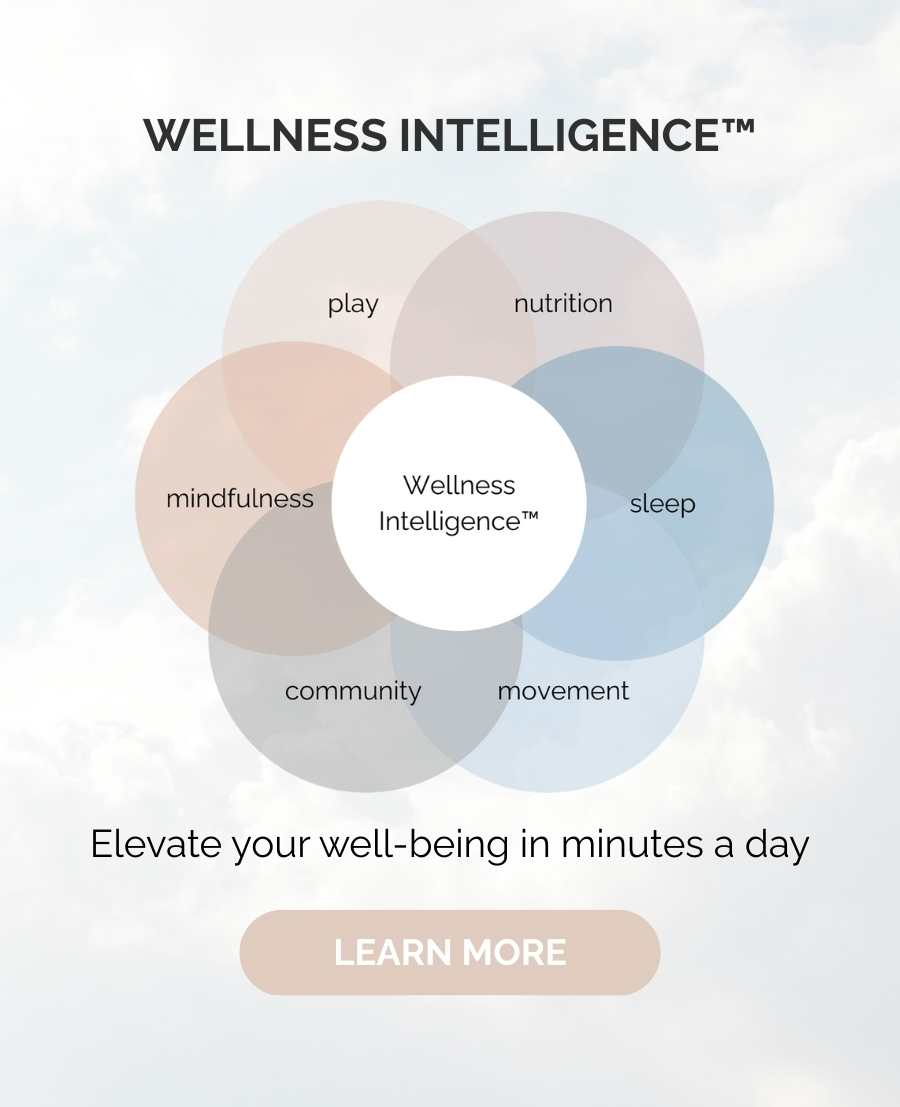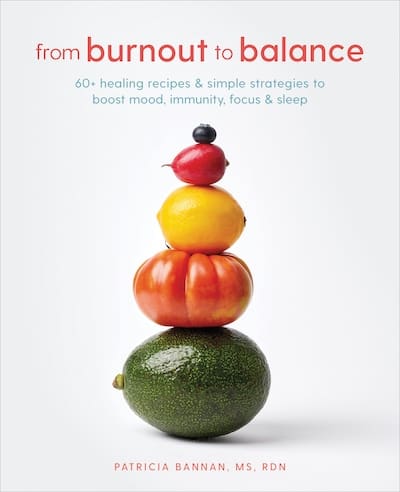Here are 6 of the best foods to eat when you have a cold, paired with 4 food categories that are worth limiting.
Runny nose, congestion, sore throat, sneezing. Yep, sounds like it could be a cold. While cold symptoms vary (and can also include headaches and fever), all colds are respiratory infections caused by more than 200 possible viruses. With so many viruses waiting to take hold, another way of thinking of it is that a cold is caused by a weak immune system that allows the virus to set in.
So, while there are many factors that can lead to a cold, what you eat can play a large role in supporting (or not supporting!) your immune system. And when burnout or chronic stress are at play (like they were for me before I overcame burnout), you’re likely holding onto every last straw to stay healthy.
Here are key things to consider, and foods to include or avoid.
Plant-Powered Eating for Immune Health
A plant-powered diet is good for every aspect of your health, including your immunity. There are specific nutrients that impact immune health, but all fruits and vegetables are good for your immune system.
6 Best Foods to Eat When You Have a Cold
“There’s no magic superfood for combatting the common cold. However, there are numerous foods and nutrients that can play helpful roles in prevention or treatment of it.” says Jackie Newgent, RDN, chef, nutritionist and author. Try including these best foods to eat when you have a cold for variety to maintain (or regain) a healthy immune system.
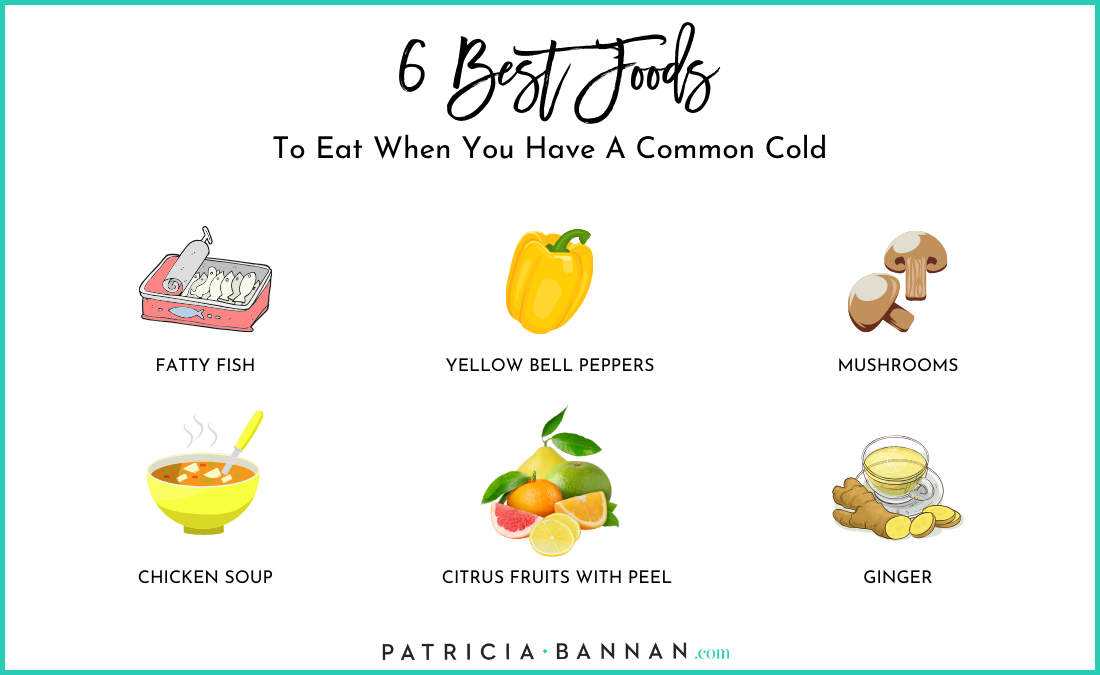
1. Fatty Fish
Fatty fish is high in omega-3 fats, which research shows helps reduce the risk of heart disease and inflammation in the body. In addition, a new animal study published in the Journal of Leukocyte Biology shows that omega-3s may also help boost the immune system by enhancing the functioning of immune cells.
You might be surprised that sardines trump their fishy counterparts when it comes to omega-3s. Here are the omega-3 amounts per three-ounce serving of each:
- Sardines, canned in tomato sauce, drained = 1,190 mg
- Trout, rainbow, wild, cooked = 840 mg
- Salmon, pink, canned, drained = 950 mg
- Tuna, light, canned in water, drained = 190 mg
To achieve optimal levels, the Dietary Guidelines recommends a daily supplement or two servings of fatty fish (such as salmon or mackerel) per week, which provides the equivalent of 250-500 mg of EPA and DHA per day.
Fatty fish also provides other important nutrients to keep your immune system running strong, including vitamin D, protein, and vitamin B12.
Learn more about the importance of omega-3s through the lifespan and plant-based options.
2. Yellow Bell Peppers
Oftentimes when people are feeling sick, the first thing they reach for is vitamin C. One of the best sources of vitamin C is a yellow bell pepper—with one large one providing 568 percent of your daily value of vitamin C.
Since it was first isolated in the 1930s, vitamin C has been thought to treat respiratory infections. Since then, research has shown that consuming vitamin C does not actually prevent colds but it may decrease the duration of cold symptoms.
“Studies suggest that regular vitamin C supplementation at levels well above the daily value may help shorten a common cold’s duration and lessen symptom severity,” says Newgent.
In addition, research shows vitamin C intake is particularly important to boosting the immunity of certain populations: the elderly, chronic smokers, extreme athletes and children.
3. Mushrooms
Rich in B vitamins, selenium and antioxidants, mushrooms have long been thought to offer immune-supporting benefits. “Mushrooms have antiviral effects, and consumption of mushrooms may be associated with an increased production of cells that fight infections,” says Newgent.
And the B vitamins in mushrooms (niacin and thiamin) help keep the immune system strong.
Mushrooms exposed to UV-light or sunlight exposure also contain high amounts of vitamin D, a key nutrient for immune support. In fact, mushrooms are the only source of vitamin D in the produce aisle.
“Maitake and shiitake mushrooms, in particular, contain plant nutrients that seem to have immune-supporting ability,” adds Newgent.
4. Chicken Soup
Yes, there is science behind the age-old adage that chicken soup helps cure the common cold!
At the most basic level, the warm liquid is hydrating, helps loosen mucus, and eases sore throats. In addition, preliminary research shows the ingredients in chicken soup may have unique medicinal properties.
“A study conducted at the University of Nebraska Medical Center found something more: The broth, vegetables and chicken in a soup tested in a lab all showed anti-inflammatory properties. The researchers studied the movement of neutrophils (white blood cells) and found they were reduced by chicken soup, suggesting the soup might have an anti-inflammatory effect, which may ease symptoms and shorten upper respiratory tract infections,” says Caroline Kaufman, MS, RDN, a New York City-based nutrition expert and health blogger.
Known as “Grandma’s Soup,” the recipe used in the study includes chicken, onions, sweet potatoes, parsnips, turnips, carrots, celery stems, parsley, salt and pepper.
5. Citrus Fruits with Peel
Since citrus fruits are packed with vitamin C, enjoying them regularly is a good idea to keep your immune system running strong. One medium orange provides 117 percent of your daily value for vitamin C.
Antioxidants like vitamin C can support immunity by fighting cell-damaging free radicals,” says Kaufman. But when it comes to citrus fruits, there may be an added benefit for those suffering from severe colds.
An easy way to include the citrus peel in your diet is to make a citrusy vinaigrette: “Whisk together fresh orange juice and a generous pinch of grated orange peel (zest) with olive oil and a squirt of lemon juice,” suggests Newgent.
6. Ginger
Whether you prefer it in your holiday cookies or your beef-and-broccoli stir-fry, ginger is a versatile spice with one of the longest medicinal histories. For more than 2,000 years Eastern medicine has recommended ginger to help cure and prevent numerous health conditions.
“Ginger has been recommended to cold-sufferers for thousands of years in Japan, China and in Ayurvedic medicine. Ginger tea is thought to be helpful at the beginning of a cold with no fever, and it may also help with nausea. Plus, having a warm cup of fresh ginger tea with honey and lemon juice can be a soothing way to loosen mucus and ease discomfort and nausea,” says Kaufman.
4 Worst Foods to Eat When You Have a Cold
While it’s important to focus on the best foods to eat when you have a cold, the worst foods are just as important to highlight. Avoiding certain foods can aid in easing symptoms and supporting recovery during a cold. Here are four main food categories to be conscious of.
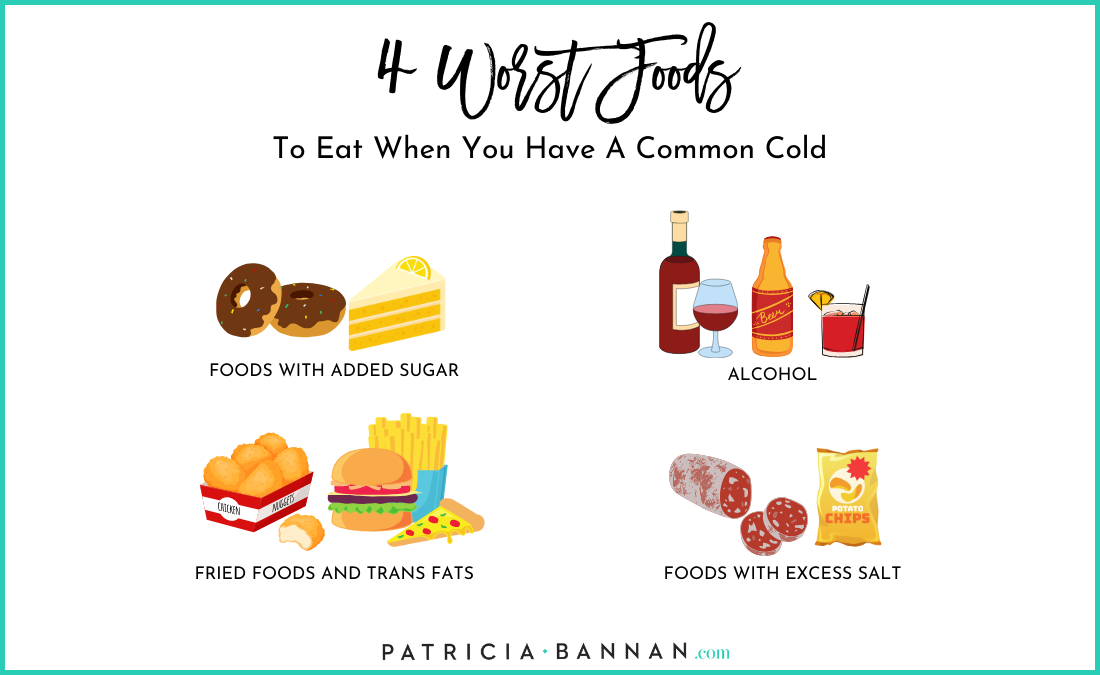
1. Foods with Added Sugar
Candy, cookies and cakes, added sugars in foods, and sweetened beverages can wreak havoc on your blood sugar, mood, and immune health. These culprits not only spike blood sugar levels but also compromise the immune system’s efficacy.
Excessive sugar consumption fosters a pro-inflammatory environment in the body, increasing the likelihood of chronic conditions and weakening immune defenses. Opting for whole, unprocessed foods with little to no added sugar can support the body’s ability to ward off illnesses and maintain overall health.
2. Alcohol
The occasional glass of wine or cocktail is fine for most people, but alcohol has no nutritional value and excess amounts can impact sleep, immune pathways, and more.
You may have heard that a daily drink might make you less likely to get sick in the first place. “Some studies show that regular and moderate consumption of alcohol may be associated with lower prevalence of the common cold,” says Newgent. Moderate alcohol intake is generally defined as up to one drink a day for women and up to two drinks a day for men.
However, drinking alcohol once you are sick will not wipe out the virus. In fact, drinking alcohol in an attempt to treat a cold could lead to dehydration, worsen your symptoms of congestion and may interact with certain medications.
3. Fried Foods and Trans Fats
Fried foods, often containing trans fats, pose a dual threat to immune health and your microbiome. These are commonly found in fast food items, snacks, and processed goods.
They are known for triggering inflammation and compromising immune function. Regular consumption of fried foods can weaken the body’s defenses, making it more susceptible to infections and illnesses.
Opting for healthier cooking methods and avoiding foods high in trans fats not only supports immune resilience but also promotes overall well-being and longevity.
4. Foods with Excess Salt
While you need some sodium (or salt) in your diet, too much added salt can impair your immune function and raise your blood pressure.
From heavily processed snacks to certain canned goods, soups, frozen meals, and fast foods, these culprits disguise their sodium content.
Even seemingly innocuous items like sauces, condiments, and pre-packaged meals often harbor hidden salt. Keep a mindful eye on nutritional labels and a conscious effort to opt for fresher, lower-sodium alternatives.
How to Apply These Lists for Best and Worst Foods for a Cold
While these lists of the best foods to eat when you have a cold (and the worst!) can be helpful, as with all things, healthy eating is about balance.
An obsession with “clean eating” is not only unnecessary, it will stress you out and increase your chances for getting a cold!
Start by choosing one or two ways to include an item on the list of foods to include, and work your way up to eating more of them for immune health.
Looking for more tips to support your immune system? My book, From Burnout to Balance has a whole chapter on immune health, which includes 25 top immunity supporting foods to include on your grocery list.
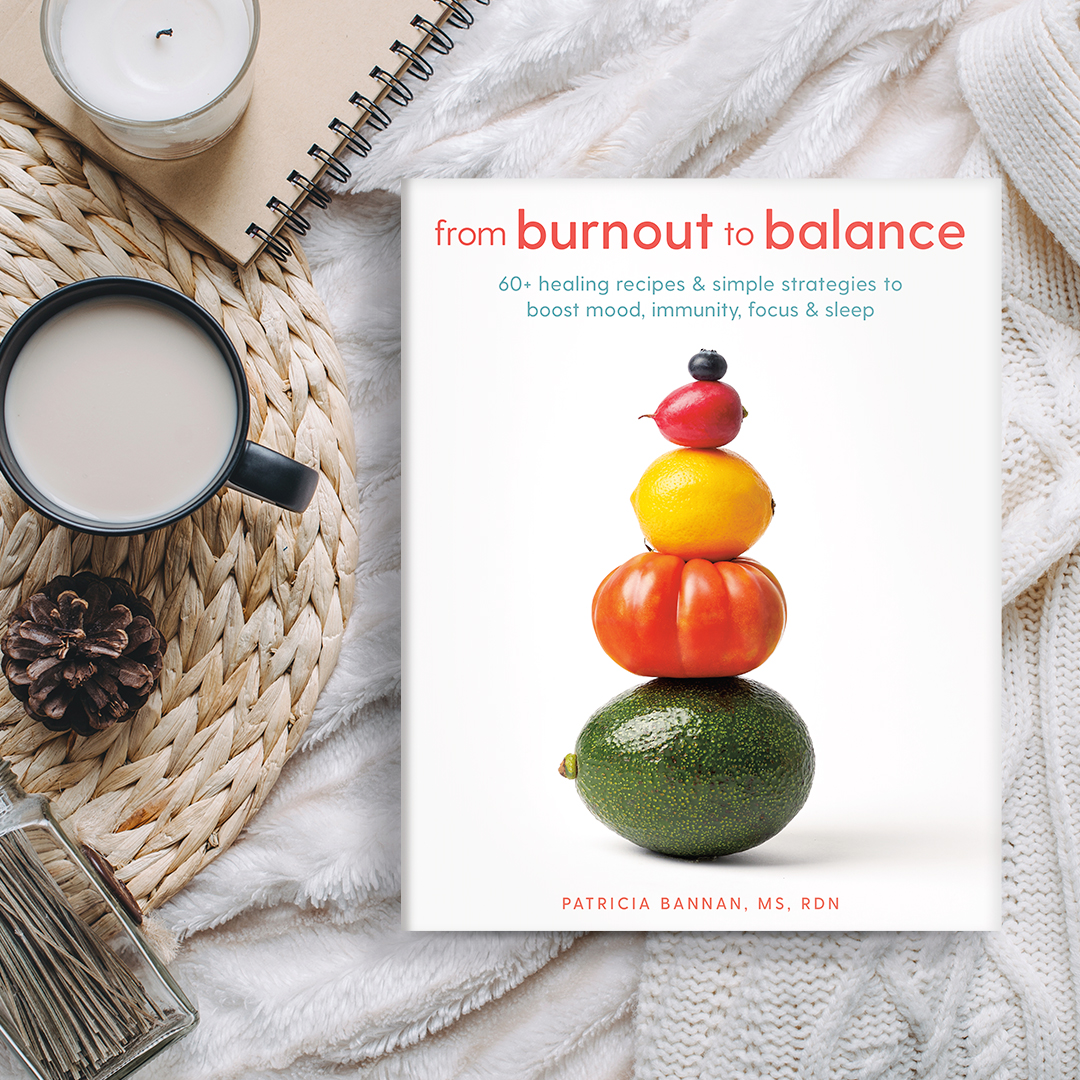
This article has been updated since its original publish date in April 2019.
References
- CDC. Suffering from a cold? Centers for Disease Control and Prevention. Published June 27, 2023. Accessed December 13, 2023. https://www.cdc.gov/antibiotic-use/colds.html
- Mori TA, Beilin LJ. Omega-3 fatty acids and inflammation. Curr Atheroscler Rep. 2004 Nov;6(6):461-7. doi: 10.1007/s11883-004-0087-5. PMID: 15485592.
- Gutiérrez S, Svahn SL, Johansson ME. Effects of Omega-3 Fatty Acids on Immune Cells. Int J Mol Sci. 2019 Oct 11;20(20):5028. doi: 10.3390/ijms20205028. PMID: 31614433; PMCID: PMC6834330.
- Office of Dietary Supplements – Omega-3 Fatty Acids. Accessed December 13, 2023. https://ods.od.nih.gov/factsheets/Omega3FattyAcids-HealthProfessional/
- Common colds: Does vitamin C keep you healthy? In: InformedHealth.Org [Internet]. Institute for Quality and Efficiency in Health Care (IQWiG); 2020. Accessed December 13, 2023. https://www.ncbi.nlm.nih.gov/books/NBK279544/
- https://www.ars.usda.gov/ARSUserFiles/80400525/Articles/AICR09_Mushroom_VitD.pdf
- https://www.unmc.edu/strategic-communications/for-the-media/press-kits/chicken-soup/research.html
- InformedHealth.org [Internet]. Cologne, Germany: Institute for Quality and Efficiency in Health Care (IQWiG); 2006-. Common colds: Does vitamin C keep you healthy? [Updated 2020 Oct 8]. Available from: https://www.ncbi.nlm.nih.gov/books/NBK279544/
- Ma X, Nan F, Liang H, Shu P, Fan X, Song X, Hou Y, Zhang D. Excessive intake of sugar: An accomplice of inflammation. Front Immunol. 2022 Aug 31;13:988481. doi: 10.3389/fimmu.2022.988481. PMID: 36119103; PMCID: PMC9471313.
- Facts about moderate drinking | CDC. Published July 25, 2022. Accessed December 23, 2023. https://www.cdc.gov/alcohol/fact-sheets/moderate-drinking.htm
- Keewan E, Narasimhulu CA, Rohr M, Hamid S, Parthasarathy S. Are Fried Foods Unhealthy? The Dietary Peroxidized Fatty Acid, 13-HPODE, Induces Intestinal Inflammation In Vitro and In Vivo. Antioxidants (Basel). 2020 Sep 27;9(10):926. doi: 10.3390/antiox9100926. PMID: 32992618; PMCID: PMC7601460.
-
Don’t fry! Give Healthy Cooking Methods a Try. www.heart.org. Accessed December 23, 2023. https://www.heart.org/en/healthy-living/healthy-eating/cooking-skills/cooking/techniques/healthy-cooking-methods





